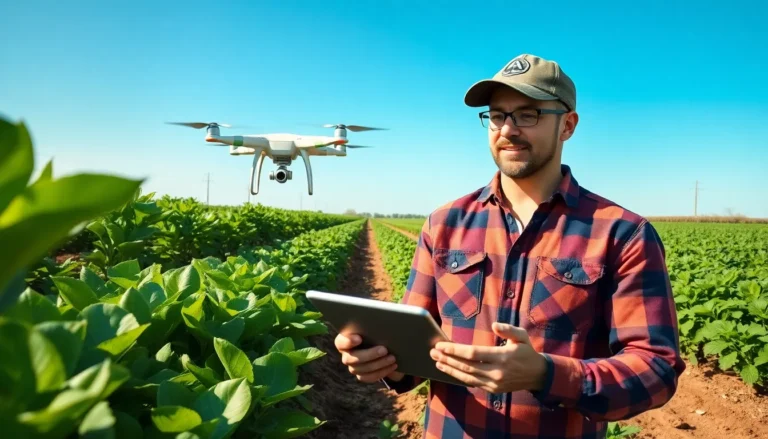Table of Contents
ToggleIn a world where climate change feels like that one awkward uncle at family gatherings—always looming and hard to ignore—Greentech startups are stepping up to save the day. These innovative companies are like the superheroes of the business world, armed with cutting-edge technology and a mission to make the planet a greener place. With their clever solutions, they’re not just reducing carbon footprints; they’re redefining how we think about sustainability.
Overview of Greentech Startups
Greentech startups focus on innovative solutions to combat climate change. These companies harness technology for environmental benefits. Many utilize renewable energy sources like solar and wind to reduce reliance on fossil fuels.
According to recent data, the global greentech market reached $11 trillion in 2021 and continues to grow rapidly. Startups in this sector have introduced sustainable practices across various industries, including agriculture, water management, and transportation.
Investing in green technologies results in a reduction of greenhouse gas emissions. Companies like Beyond Meat and Tesla exemplify how greentech can disrupt traditional markets.
Numerous startups prioritize circular economy principles, aiming to minimize waste while maximizing resource efficiency. Technologies such as energy storage and smart grids also play a critical role in enhancing energy management.
Greentech innovation benefits from the support of investors and governments alike. Funding for greentech startups increased to $7.1 billion in 2022, reflecting growing confidence in sustainable business models.
Startups often collaborate with research institutions to accelerate development and deployment of sustainable technologies. These partnerships enhance their capabilities and promote knowledge exchange.
Focusing on scalability, many startups aim to deliver solutions that can be implemented worldwide. Economies of scale lead to more affordable products, making sustainable options accessible to a broader audience.
Overall, greentech startups represent a significant force in the transition to a sustainable future, driving technological advancements and promoting environmental responsibility across various sectors.
Key Trends in Greentech

Greentech startups are at the forefront of innovative solutions reshaping the sustainable landscape. They focus on trends that promise to revolutionize how industries operate.
Renewable Energy Innovations
Innovations in renewable energy play a crucial role in the greentech sector. Companies prioritize solar and wind technologies, which drastically reduce reliance on fossil fuels. For instance, advancements in solar panel efficiency have made solar power more accessible and affordable. Energy storage solutions enable the use of renewable sources even when the sun isn’t shining or the wind isn’t blowing. Smart grids enhance energy distribution, making it more efficient and reliable. The global investment in renewable energy reached $500 billion in 2022, reflecting a commitment to cleaner energy sources. Greentech startups harness these technologies to meet the increasing demand for sustainable energy options.
Sustainable Agriculture Solutions
Sustainable agriculture solutions are gaining traction among greentech startups. These companies implement practices that minimize environmental impact while maximizing productivity. Precision farming technologies utilize data analytics to optimize resource use, significantly reducing water and fertilizer waste. Vertical farming systems offer urban populations fresh produce grown locally, enhancing food security. Biodegradable packaging is also emerging, addressing waste issues associated with single-use plastics. In 2021, the sustainable agriculture market was valued at $15 billion, showcasing its importance. Through innovative approaches, startups promote practices that contribute to an overall more sustainable food system.
Challenges Faced by Greentech Startups
Greentech startups encounter several challenges that can hinder their growth and effectiveness in promoting sustainability.
Funding and Investment Hurdles
Accessing capital presents a significant barrier for many greentech startups. While funding reached $7.1 billion in 2022, competition for these resources remains fierce. Many investors prefer established companies over startups with unproven business models. Startups often struggle to demonstrate short-term profitability, causing uncertainty among potential backers. Furthermore, early-stage companies might face difficulties in securing investments from traditional venture capitalists. Difficulties in attracting angel investors also hinder their ability to scale. Crafting compelling narratives around their social impact can help mitigate these funding hurdles.
Regulatory and Policy Issues
Navigating regulatory frameworks poses another formidable challenge. Many greentech startups operate in sectors with complex regulations that vary by region. Compliance with environmental laws can be resource-intensive and confusing. Policy shifts can unpredictably impact market dynamics, complicating long-term planning. Startups often lack the legal expertise to address these challenges effectively. Legislative changes may introduce new fees or compliance requirements that strain financial resources. Engaging with policymakers and industry groups can provide clarity and facilitate smoother operations.
Success Stories in the Greentech Sector
Greentech startups are making significant strides in sustainability. These companies innovate to address climate challenges and create eco-friendly solutions.
Notable Greentech Startups
Tesla stands out as a leader in electric vehicles and energy solutions. Beyond Meat disrupts traditional agriculture by providing plant-based protein alternatives. Other startups, like SolarCity, harness solar power to promote renewable energy. Each of these companies showcases how innovative approaches contribute to cleaner technologies. The greentech market’s valuation signals confidence in their models, with investment reaching $7.1 billion in 2022.
Impact on the Environment
Greentech startups significantly lower greenhouse gas emissions. Innovations foster practices that minimize ecological footprints across industries. For example, Tesla’s electric vehicles and Beyond Meat’s products reduce reliance on fossil fuels. The shift towards solar and wind technologies demonstrates a commitment to sustainability. Data shows a $500 billion investment in renewable energy in 2022, enhancing energy management. Implementing solutions in sustainable agriculture, such as precision farming, optimizes resource use and bolsters food security. Each initiative contributes to a collective effort toward a greener planet.
Future of Greentech Startups
Advancements in greentech signal a promising future for sustainability. The global greentech market, valued at $11 trillion in 2021, continues to expand rapidly. Increased funding reached $7.1 billion in 2022, showcasing rising confidence in these startups and their sustainable business models. Technologies such as solar and wind power dominate the renewable energy landscape, with significant investments of $500 billion made in 2022.
Innovations in energy storage and smart grids enhance energy management capabilities. Startups are prioritizing user-friendly solutions that make renewable energy more accessible. As sustainability becomes a global priority, greentech companies like Tesla and Beyond Meat exemplify successful disruptive technologies across various industries. These leaders demonstrate the potential to lower greenhouse gas emissions significantly.
Focus on the circular economy drives startups to minimize waste and maximize resource efficiency. Continuous collaboration with research institutions accelerates the development of cutting-edge sustainable technologies. Precision farming and vertical farming systems are key trends in sustainable agriculture, enhancing food security and optimizing resource use.
Despite challenges, such as securing capital and navigating complex regulations, greentech startups remain determined to forge a sustainable future. They engage with policymakers and industry players to address these hurdles effectively. Expectations for continued growth in this sector remain high as more startups emerge with innovative solutions. Ultimately, greentech startups act as a catalyst for positive environmental change, driving technological advancements that promote a more sustainable world.
Greentech startups are at the forefront of the battle against climate change. Their innovative solutions not only promote sustainability but also inspire a shift in how industries approach environmental responsibility. With increasing investments and support from both governments and private sectors, these companies are poised to redefine the future of energy and resource management.
As they continue to develop technologies that enhance efficiency and accessibility, the potential for widespread adoption grows. The commitment to a circular economy further strengthens their impact, ensuring that sustainability becomes an integral part of business practices. The journey ahead may be challenging, but the resilience and creativity of greentech startups promise a brighter, more sustainable future for the planet.







